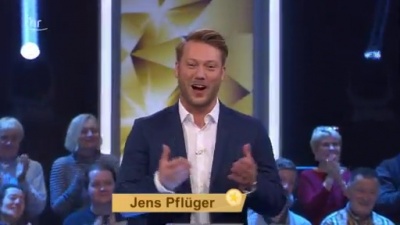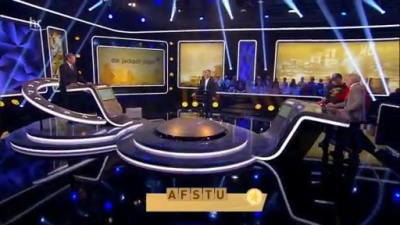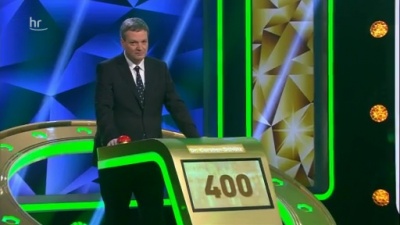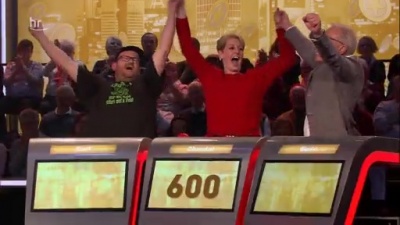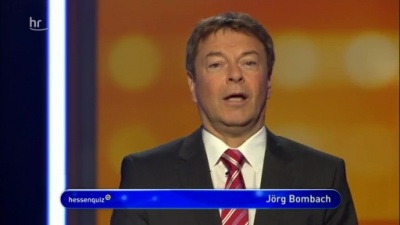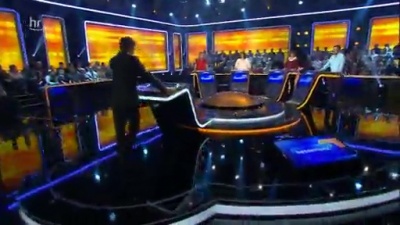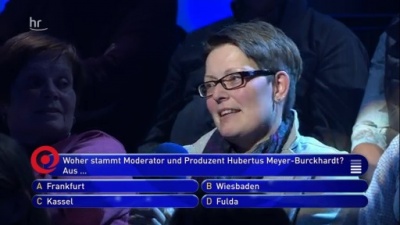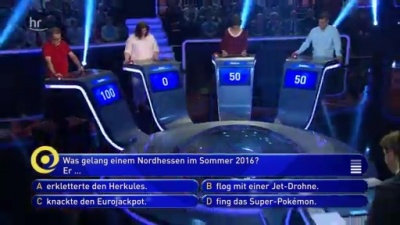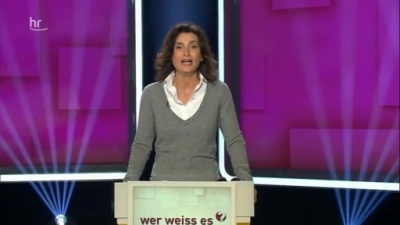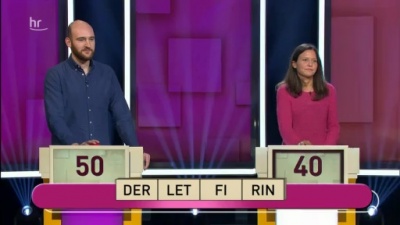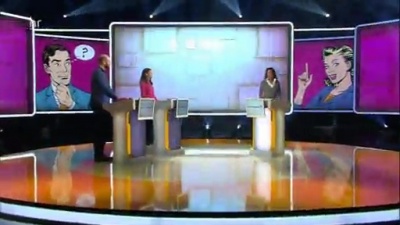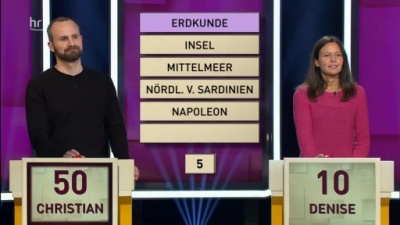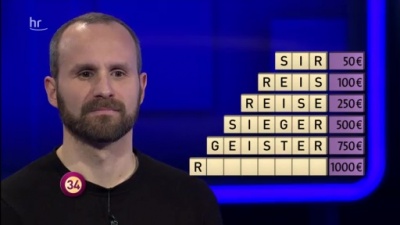Weaver's Week 2019-10-06
Last week | Weaver's Week Index | Next week
Guten tag von Frankfurt! Die Wöche ist im Urlaub, und trinken viel Apfelwein.
But we're not here to show you holiday snaps, nor discuss the best Main-Rhine valley cider. We're here to talk game shows.
The country known to Richard Osman as "Germany" is a federation of distinct Länder, regions. There are broadcasters talking to the whole of Germany. ARD and ZDF provide national television services, as do a number of private operators; Deutschlandfunk give a national radio service.
There are other broadcasters talking to each of the administrative regions. Frankfurt is in Hessen, one of the larger and more populous Länder. It's large enough to have its own television and radio broadcaster, the Hessischen Rundfunks (always known as HR). It provides shows that the national broadcasters will never make, and a few that they might but don't.
Let's look at three recent game shows from HR. All are available on the web, and without geoblocking.
Contents |
Die Jackpot Jäger
Sample episode: May 2019
This is our favourite of the three shows, a 50-minute local quiz with elements of The Chase. Three contestants apply as a team of Hunters, and they hope to beat The Master, an academic with at least one doctorate. Jens Pflüger is the host, a sharply-dressed young man, as energetic and welcoming as Ben Shepherd. He wills the team on to success, though he's always scrupulously fair.
The first round is questions about local celebrities and personalities. At the start of the round, we see the name of the local hero scrambled into alphabetical order before Jens gives some clues. Later, we just hear the clues. The Hunters or the Master buzz in, 50 points if they're right, 50 away for a wrong answer – but scores cannot fall below 0.
After about ten minutes of this, the round comes to an end. There are points for both sides. Round two is the Random Board – six questions worth 100 points each, and three squares with booby traps – they might reduce the Hunters' score to 0, or have them eject a player for the rest of the round. The questions are mostly true-or-false, but could also be a rebus. Again, this round takes about ten minutes to play, and we're surprised at that length – Jens keeps the tempo and excitement going even when there aren't many questions.
Round three is a travel bet: can you find a city in Hessen when they rotate the map? Let's use a domestic example: think of the map of Britain, and swivel it on its side. Now find Sheffield. Closest answer wins. Other questions ask for the flying distance from Frankfurt to Hokkaido, and the link between Frankfurt and Hokkaido.
Round four will be familiar to those who watched Schlag den Raab and its descendants. Here are seven things, and the object is to put them in an ordered list. On each turn, say which item you're putting in, and where – for instance, you might say "Hessenpark, above Bulle and Bär", which means it's below Startbahn West. As the list nears completion, it's more difficult to guess the right order. Points for each correct answer, play passes to your opponents on an incorrect answer. Unlike the other rounds, this both takes a long time and feels like it's taking a long time.
The fifth and final round features multiple choice questions – with a twist. Jens reads out the question, and three possible answers. The sides select their answers, and it's 200 points if they're right – and 200 off if they're wrong. So far, so Chase like.
But there's a twist. At any time before Jens starts reading out the third option, either the Hunters or the Master can buzz in and answer the question with the information available. That's for double the score – 400 points on a right answer, 400 away if they're wrong. Neither side's score can fall below 0, so the Master can lose points while the Hunters remain on 0. It's often possible for the Hunters to stage a massive come-from-behind victory with a Hail Mary on the final play.
This format could easily work on anglophone television – indeed, we recognise most of the elements already. The prize budget isn't huge – the jackpot starts at 4000€ and grows by 2000€ per episode, so we're talking Tipping Point rewards.
Die Jackpot Jäger does two things very well. First, it creates atmosphere. Jens hosts the show to make it fun, even when the cause seems hopeless. The structure is such that it's difficult for the Master to get completely out of sight, there will always be something to play for in the final round.
And the second thing Die Jackpot Jäger does well: it grounds the quiz in its local area. Every question has some link to the state of Hessen: famous residents, the geography, the history, landmarks, factoids about the towns and inhabitants. The show celebrates its area, without the egregiously show-off attitude we got from Ik Hou van Holland.
Die Jackpot Jäger effectively replaced an earlier local knowledge show.
Hessenquiz
Sample episode: January 2017
Jorg Bömbach hosts this show, and it runs a little bit shorter, at 45 minutes. (There might be ad breaks in this time, but because the HR web player doesn't put ads in the middle of the show, we don't know.)
Four contestants take part, and we hear a very brief introduction. Almost straight away, it's into round one, a set of multiple choice questions, with fifteen seconds to answer. None of this buzzing-in early tactic, it's a simple 50 points for each answer.
Like Die Jackpot Jäger, the action takes place before a studio audience. There are lots of uplights everywhere, plinky-plonky clock music, and monitors allowing for some epic camera sweeps from ceiling to floor.
Both shows share a similar look – not just a set design of podia rising from a central button, but a similar typeface and colour scheme. These visual elements are common to all HR programmes, they give the broadcaster a clear identity. It's as if the BBC said that all BBC1 programmes would be in white-and-red, using their Reith typefaces.
And we're thinking about this because the first round is long. Five questions, but Jorg invites discussion from the contestants from each question, and shows some sort of explanation of the answers. It's almost 12 minutes before the first contestant leaves the programme, the lowest score in the five questions.
The second round is another five multiple choice questions. Children from primary schools in Hessen describe something, and there's a clip from the HR archives. Lowest total score after five more questions leaves.
The contestants also get two lifelines to play in the remainder of the game. The "Joker" picks someone out at random in the studio audience, and asks them to answer the question – 50 points to the contender if they're right, and a crisp €50 note to the member of the audience. The "Reserviert" lifeline is to be played once the subject has been announced, but before the question begins. It reserves the question for one player, and bags a full 150 points if they're right.
The final round follows a similar pattern, just two contestants and less opportunity for chatter as the tension ramps up. There's a sixth question in this round, and after the last question, the winner is found. They take away a coveted Hessenquiz trophy and a weekend break, and the credits roll.
This show didn't hold our attention as much as its successor did. The pace was sluggish, 15 seconds to choose between four options is an awfully long time, and then there's explanation and discussion, and sometimes a video setup. It's slow and ponderous, and Jorg doesn't have the charisma that Jens had.
On the positive side, the various lifelines brightened up the programme, particularly springing a surprise on someone through the "Joker". And, again, the questions are all about Hessen, this is a show about the local area, for local people. Across the series, across the years, your little village will get its namecheck on screen.
Wer Weiss Es?
Sample episode: December 2018
They may never have made a success of Countdown in German-speaking territories, but that doesn't stop them from trying a language game of their own. Wer Weiss Es? is the Hessen effort, and it goes out late in daytimes.
We start with two contestants, and they see a word – the first letter, the last letter, a space for all the other letters in the word. Host Petra Theisen starts giving clues to the mystery word, and the players buzz in to complete it. Ten points (just 10, not 50) for each correct answer. And, as it's a show on HR, there's a particular typeface and a particular look to the set and graphics.
After a few minutes of this – proving that this column's German isn't quite up to answering quiz questions before the contestants – we move to the next round, "Silbentausch". The German language is famed for its long words, and here some of them have been chopped up into their component syllables, and rearranged. Simply re-order the syllables to make a correct word. Wasn't this a round on S4C's Un Cwestiwn earlier in the year? So it was.
"Buchstabenmix" is the next round, simple anagrams. The letters are always given in alphabetical order, just as they were on the first round of Die Jackpot Jäger. Clearly, there is a style guide for shows on HR, and everything looks just that little bit more consistent and just that little bit more satisfactory as a result.
"Songs & Co" asks the players to identify a song, first from the instrumental break, and then from the performer singing the title. Can you recognise the mid-90s eurohit "Maria Magdalena" when Sandra is singing the title to you? It's a little less pressured than the earlier rounds, a useful change of pace.
"Kreuzweise" is a simple crossword, slightly easier than the ones we found on Cross Wits. Whoever's behind gets first pick of the clues. Solve it in ten seconds, and it's 10 points plus the next pick of the clues. Fail, and the opponent will pick the next clue, and gets a chance to solve this one as a bonus. Should both miss, the clue will be solved for them.
Highest score after this round wins, and will come back for the daily final. They've crammed a lot of quiz into 13 minutes, and they're going to do it all over again, with two different contestants. Same rounds, different questions, and another winner.
For the daily final, it's similar rounds, but a bit different. "Wer Weiss Es?" (what is it?) still shows the number of letters in the answer, but doesn't give us the first or last letters.
"Tipp für tipp" gives a series of very short clues that all point to a particular answer. Remember Rylan's shopping lists on Supermarket Sweep last week? It's the same idea, put into a very different setting. Each clue reduces the points available, from 25 if you're prepared to guess from just the general category, down to just 5 if you need more clues.
"Schlüsselwort" is quite a long round. Petra is looking for a very long word, and will get there by a very indirect route. She will give clues to other words, in the style of the "Wer Weiss Es?" round earlier. The first letter of each answer appears in the target word, in the right place. After you've given a correct answer, you can solve the very long word for bonus points. With points awarded for the individual words, the scores rocket like we're watching Stephen Mulhern's Catchphrase.
"Hingucker" is a short set of picture questions: where is this the flag of, what is this a rebus for? Again, it's something different to stop the contest from becoming monotonous.
"Top Ten" asks our players to give answers that belong on a top ten list. So far, so Tenable. The players take it in turns, starting with whoever's behind. The round stops when the list is complete, or when both players miss in succession. Whoever's ahead after this round has won, and plays the bonus round.
In the bonus round, the player starts with a three letter word, and adds one letter at a time. The player is told what letter is to be added, and where in the word it appears. Any valid word will be allowed, not necessarily the one the producers thought. There's 45 seconds of thinking time allowed, and a decent daily top prize of 1000€.
Petra is a brisk host, always ready to move on to the next round. There's very little idle chit-chat, just enough to bring out a little of the contestants. The show divides into segments of about 12, 12, and 20 minutes, with a very short endgame.
We're getting vibes of "this is the sort of show Alphabetical could have been". – not that the show would have had precisely this format, but the mixture of challenges could have livened up an otherwise dull experience.
Closing thoughts
In this brief roundup, we've not seen anything particularly groundbreaking, we've seen programmes done well, and in a particular house style. Viewers in the area can look at a scoreboard and a graphic and think, "ah, that's a HR show". On these islands, not even the BBC is able to enforce a consistent look and feel across all its shows.
HR is an establishment broadcaster for its region. Its funding is guaranteed by law, a tax of 17,50€ per household per month (that's about £190 a year, slightly more than the BBC's license). The television station has had 55 years on air, long enough to become part of the cultural landscape. It knows its audience, and serves them with perfectly fine programmes.
Jeremy Hunt, during his tenure as Culture Minister, pushed through a large number of "local" television stations. He might have envisioned the success of HR and its partner broadcasters across Germany, providing a level of television smaller than the whole nation. But Hunt was decades too late to the party, and gave paltry budgets for the project. Now that the government handouts have run out, "local" television is reduced to hours of Judge Judy and low-quality "news where you are", and viewing figures that might reach the dizzy heights of 0.
HR and its partners do provide a localised television service. It's television from the area, for the area. In that respect, it's something more akin to the original ITV franchises, when they made their own decisions about what programmes to buy and make and show. Over the 90s and early 00s, ITV chose to provide the same programmes to everyone, the same one-size-fits-all nationalised policy is now applying to commercial radio.
German society chose not to go down that route, it has chosen to maintain and cherish its local television stations, and they make programmes worth talking about. The "local" television and radio stations on Britain do not.
This Week and Next
BARB ratings in the week to 22 September.
- Strictly Come Dancing is back (BBC1, Sat, 9.6m), eclipsing Bake Off (C4, Tue, 8.75m). The biggest non-game remains Coronation Street (ITV, Mon, 6.85m).
- Got Talent The Champions was damaged by its later slot, pushed back by an hour to avoid a Strictly clash (ITV, Sat, 5m). One Man and His Dog proved popular (BBC1, Sun, 4.6m), expect a series. Celebrity Masterchef continued on BBC1 (Mon, 4.2m).
- Who Wants to be a Millionaire (ITV, Sun), The Chase (ITV, Mon), and Pointless Celebrities (BBC1, Sat) all broke 3m, and The Chase Celebrity Special (ITV, Sat) was just under.
- Dragons' Den ruled on BBC2 (Sun, 2.8m), where Only Connect (Mon, 2.35m) proved much more popular than University Challenge (Mon, 2.15m). Bake Off Extra Slice did the business on Channel 4 (Fri, 1.65m), and The Great Model Railway Challenge held up on Channel 5 (Fri, 915,000).
- Dave has two of the week's big digital shows, Taskmaster (Wed, 1.24m) and Comedians Giving Lectures (Wed, 520,000) – the latter is just game enough for our purposes. Slotting in between is A League of Their Own (The Satellite Channel, Thu, 705,000), and coming fourth is Swashbuckle (Cbeebies, Sun, 335,000).
Two shows for BBC1 daytimes. Headhunters is a new quiz, with a team-or-solo gimmick; Make Me a Dealer is also back. On Channel 4, Your Room or Mine? features interior designers working against each other through the week. House of Games (3) with Richard Osman and more celebrities (BBC2), and Celebrity Coach Trip (E4).
In primetime, Pants on Fire (E4, Thu) asks daredevils to pretend they've done a stunt, and convince the panel they have, even if they haven't. Panel shows return: There's Something About Movies (The Satellite Channel, Thu), Celebrity Juice (ITV2, Thu), and Have I Got News for You (BBC1, Fri).
Photo credits: HR.
To have Weaver's Week emailed to you on publication day, receive our exclusive TV roundup of the game shows in the week ahead, and chat to other ukgameshows.com readers, sign up to our Yahoo! Group.


